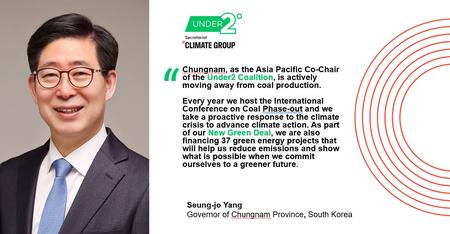On 23 April, during US Climate Action Week, South Korean President Moon Jae-in announced his country would end all new financing for overseas coal projects and would set a more ambitious schedule for cutting carbon emissions.
This announcement was welcomed by the Under2 Coalition's Asia-Pacific Co-Chair Seung-jo Yang of Chungnam Province, who has been working for some time to phase out coal production and develop green energy initiatives. Chungnam has shown significant progress here and continues to emphasise the need for a just transition to tackle climate change equitably.

In responding to the dual threats of climate change and the economic challenges of COVID-19, the South Korean Government released its ambitious Green New Deal at the end of 2020 and has committed to reach net zero by 2050. Fostering renewable energy production, green infrastructure and green job creation are some of the deal’s key priorities - but to achieve these the country needs to phase out coal and distance itself from investments in overseas coal projects.
South Korean provinces and prominent businesses are leading on climate action and coal phaseout. Five major Korean provinces, including Chungnam, are members of the Powering Past Coal Alliance. The Climate Group’s flagship campaign RE100, has also enabled businesses in South Korea to globally commit towards transitioning to 100% renewable power. Six SK group companies – the third largest conglomerate in South Korea - are members of the RE100 initiative and are among 70 global companies with a footprint or headquarters in the country. This sends a strong market signal that renewable energy is not only environmentally beneficial but also makes economic sense.
The world has been hit hard by the COVID-19 pandemic yet, within the space of a year, South Korea has emerged as a leader in its efforts to tackle climate change. Businesses, subnational governments and the national government have shown they are eager to boost the Korean economy in a sustainable and equitable way by phasing out coal, promoting green jobs and becoming net zero by 2050.
The spotlight is on South Korea as they build momentum and lead the way on solutions to the climate problems we all face. It is now up to other East Asian economies to follow their example.
